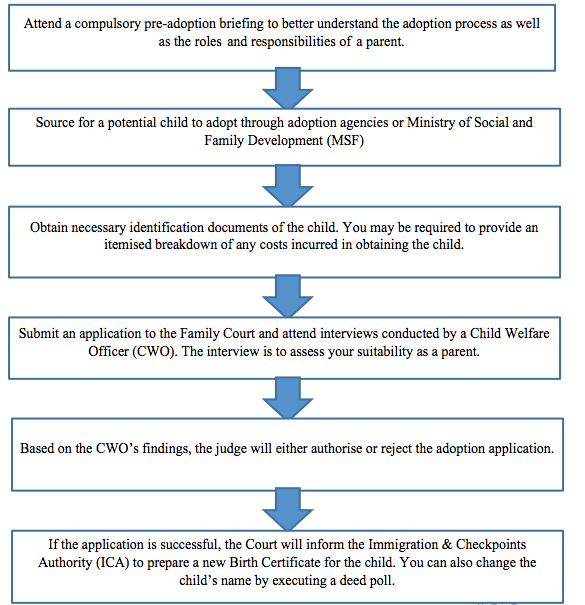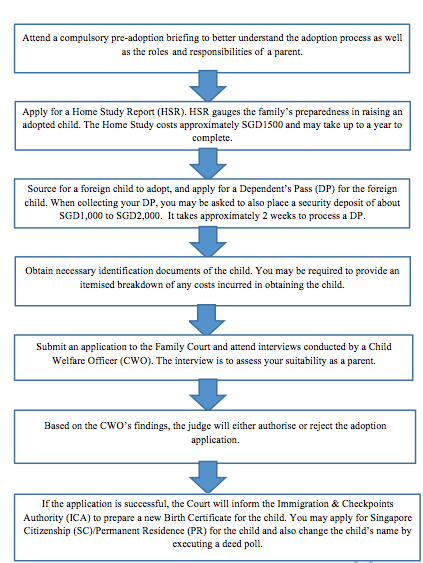Adoption provides an avenue for people to raise and nurture a child to adulthood. Every year, about 300 to 400 adoption applications are filed. However, the numbers have been dwindling recently. This could be due to the administrative processes that some people may find tedious or complicated. Therefore, I will be simplifying Singapore’s adoption law via this article in case you are considering adopting.
What is adoption?
Adoption is a legal process administered by the Adoption of Children Act (ACA). Adoption essentially cuts off the ties between the biological parents and a child, and in place, fosters a new legal relationship between a new set of parents and the child. This can only be done via a court order. The court order ensures that the relationship between the child and his new parents and that of the child and his biological parents are one and the same. This means that the new parents of the child would have the same responsibilities as the biological parents of the child would have had. Responsibilities of a biological parent include, but are not limited to:
- Providing maintenance to the child to ensure their needs are financially met;
- Care for the child, and provide them with a loving home;
- Provide the child an education;
- Be responsible for making major decisions for the child such as those relating to education, religion and healthcare; and
- Playing an active, positive role in the child’s life and being involved in their lives to nurture them.
Eligibility criteria:
There are several statutory requirements that have to be met, for both the adopted child and the applicant for the adoption application and process to be successful.
I. Statutory Requirements
A. Child to be adopted (s3(2) of ACA)
- Younger than 21 years of age and should not have married
The age requirement has been put in place since it would not be necessary to adopt someone who is already an adult. Additionally, a child need not sever his ties with his biological parents or form a new relationship in place of it, after he or she is married.
- Resident of Singapore
This means that the child has to be a Singapore citizen (SC), a permanent resident (PR) or a Dependent’s Pass (DP) holder. However, do note that foreign children can also be adopted, as long as you comply with the laws of their home country.
B. Adoptive Parent (s4 of ACA)
- Be at least 25 years old
- Be at least 21 years older, but no more than 50 years older than the child
- Be a resident of Singapore
The age criteria has been set to maintain a healthy age gap between the adoptive parent and the child so that the parent-child relationship is a suitable one. It also ensures that you have the physical and financial means to take care of the child. However, if you do not meet the age criteria, it does not automatically mean you cannot adopt a child.
The court may grant an adoption order, even if you are below 25 years of age or less than 21 years older than the child. These are however under strict circumstances; you and the child have to be either close blood relatives, or prove to the court that it is only right to allow the adoption.
You need not necessarily be married in order to adopt a child. Therefore, single people may also apply for adoption. This is subject to several conditions as follows:
Single male:
- If you are a single male, you cannot adopt a female child, unless you can prove that you and the girl are closely related.
Adoption by 2 singles:
- You and another single person may not apply to adopt the same child. As such, a joint application for an adoption of a child is only accepted if the two applicants are spouses.
Homosexual couples:
- Adoption of a child by homosexual couples is not permitted since same-sex marriage has not been legalised in Singapore.
Finally, if you are married, but adopting a child solely by yourself, the consent of your spouse must be obtained prior to the application.
II. Other Requirements
A. Welfare of the child
- The court would take into account the needs and wants of the child. The judge has a wide discretion in deciding whether this requirement is fulfilled. Section 5(b) of ACA explains that the court would deliberate whether the adoption would serve to the best interests of the child. An assessment of the child’s wishes would also be made, keeping in mind his age and level of maturity and understanding.
- While being financially stable would help bolster your adoption application, do keep in mind that wealth alone is not sufficient in serving the welfare of a child. Your family environment plays an equally important role in the outcome of your application. For example, if you are in an abusive spousal relationship, the court would not risk placing a child under your care. This is because it would not be in the best interests of the child to grow up witnessing his or her parents constantly arguing or physically hurting one another. Therefore, in such a scenario, an adoption application is unlikely to be successful.
B. Real Consent
- The consent of the following people is required for an application for adoption to be successful:
- Parent or guardian of the child; or
- Someone who has actual custody of the child; or
- Someone who is liable to contribute to the support of the infant.
The above-mentioned terms have no fixed definition and are to be interpreted broadly by the court. The broad definitions are as follows:
| Description | Broad Definition |
|---|---|
| Guardian of the child | Two possible meanings: either refers to a non-parent who has been formally been appointed as guardian OR a casual caregiver of the child. |
| Someone with actual custody of the child | Either someone appointed as the child’s guardian by a court order or someone who has ‘actual possession of child’. |
| Person liable to contribute to support of child | Either a parent who is in-charge of providing maintenance to a dependent child or a person who recognises a child that is not his, but treats the child as his family member. |
- The consent obtained should be real and not an inferred one. This means that the person must have understood the consequences of consenting to an adoption – renouncing all of his or her rights over the child.
- The person also has to sign and acknowledge a form that informs him or her of the effect of agreeing to an adoption.
- The court may choose to omit the consent of some people. These people include those who are either physically or mentally incapable of providing a proper consent. If the person has deserted the child, or has behaved inappropriately towards the child, his consent would be disregarded.
- In deciding whether to disregard the consent of a particular person connected with the child, the court would first consider if the adoption is in the best interests of the child. If so, any refusal to consent would be tantamount to denying the child of their The court would in that case, omit the consent of that person.
C. No exchange of money
- According to section 11 of the ACA, no exchange of money is allowed in relation to the adoption of the child. However, if you have exchanged money, the court has to approve this transaction before an adoption order can be granted. This step is critical as any unauthorised payment of money during the adoption could be mistaken for child trafficking, an offence under the Children and Young Persons Act (CYPA).
Adoption process
The length and duration of an adoption process varies according to the citizenship of the adoptive child or parent. A typical adoption takes about 5-7 months to be finalised. The adoption process for a Singaporean/PR child is as follows:
The adoption process for a foreign child (non-PRC) is as follows:
Possible outcomes of application
Based on the merit of the application, the court would issue one of the five following outcomes:
- No adoption order granted
- Court adjourns the proceedings to allow the plaintiff to build a better case for an adoption
- Court makes an interim order
- Court makes a conditional adoption order
- Court makes an unconditional adoption order
No adoption order granted
- This is usually the result of the failure of fulfilling any of the criteria set out under the ACA. However, you can give the adoption another shot, as long as you can convince the court that there has been major changes to your application, thus warranting a reassessment of it.
Adjourning proceedings to allow plaintiff to build a better case
- This is not an outright rejection of an adoption application, but is instead an indicator that the court is willing to give the application a serious thought. It is likely that certain requirements have still not been met. Therefore, the court postpones the proceedings to provide you with more time to build a stronger case for an adoption.
Interim order
- If you are given an interim order, you would have custody over the child for a maximum of 2 years. This serves as a probationary period for the court to monitor your quality of upbringing before deciding to authorise the adoption. There are currently no reported cases where the court has made an interim order. An interim order would not be an ideal outcome for many applicants since it does not guarantee that you will be the adoptive parent of the child.
Conditional order
- The court could also grant an adoption order, subject to certain conditions. The court is given a wide discretion in stipulating the various terms and conditions as it deems fit. The conditions imposed would vary on a case to case basis and will be subjective to each respective application. Once again, there are no reported cases of the court granting orders with special conditions.
Unconditional order
- This is the most common and also the most ideal outcome. Once this order has been made out, the relationship between the birth parent and child will be irrevocably cut off. In turn, you will be legally acknowledged as the parent of the child, and will be bestowed with the responsibilities of any biological parent towards their child.
Once an adoption order has been granted, the court will not authorise a retraction of it. For instance, after gaining adoptive rights over the child, if you suddenly experience inconvenience or difficulty in raising the child, you cannot apply for a rescission of an order. Adoption is not to be treated lightly and hence, it would be wise for you to carefully consider the responsibilities and potential challenges before going ahead with the application.
It is not unusual to perceive adoption as rather daunting given the number of pre-requisites and the lengthy adoption process. However, adoption law in Singapore has been crafted in a way to prioritise the child’s welfare. The focus is to ensure that the child grows up in a loving and healthy environment. Therefore, the stipulations and conditions imposed serve to act as a safeguard for the adoptive child. When viewed in context, we hope that you realise that the gift of parenthood is worth a little effort and patience.
For more information on adoption, we strongly recommend that you contact MSF or any of the accredited adoption agencies. You can also visit the MSF’s website for more information on adoption in Singapore.
Have a question on adoption?
If you have any questions or require legal advice, you can request a quote with Devaraj Viveganandam. You can also get a Quick Consult with other lawyers. With Quick Consult, from a transparent, flat fee of S$49, a lawyer will call you back on the phone within 1-2 days to answer your questions and give you legal advice.
This article is written by Devaraj Viveganandam from I.R.B Law LLP and Mohamed Shafie from the Asian Law Student’s Association.
This article does not constitute legal advice or a legal opinion on any matter discussed and, accordingly, it should not be relied upon. It should not be regarded as a comprehensive statement of the law and practice in this area. If you require any advice or information, please speak to a practicing lawyer in your jurisdiction. No individual who is a member, partner, shareholder or consultant of, in or to any constituent part of Interstellar Group Pte. Ltd. accepts or assumes responsibility, or has any liability, to any person in respect of this article.



